This article needs additional citations for verification .(April 2021) |

Colonel The Honourable Kanwar Pratap Singh Bahadur of Kapurthala (1871-5 December 1911) was a Punjabi politician and scholar.
This article needs additional citations for verification .(April 2021) |

Colonel The Honourable Kanwar Pratap Singh Bahadur of Kapurthala (1871-5 December 1911) was a Punjabi politician and scholar.
The son of Bikrama Singh of Kapurthala, Pratap Singh was an honorary magistrate and civil judge in Punjab. He served as a member of the Punjab Legislative Council from 1906 to 1911 and the Imperial Legislative Council 1910–1911. He was a founder of the Punjab Chiefs' Association.
Actively involved in the Sikh renaissance movement, Pratap Singh was a scholar of history and religion and was an eminent musicologist of his time.
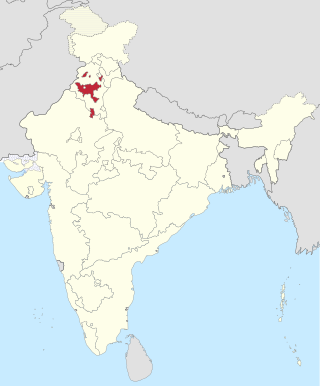
The Patiala and East Punjab States Union (PEPSU) was a state of India, uniting eight princely states between 1948 and 1956. The capital and principal city was Patiala. The state covered an area of 26,208 km2. Shimla, Kasauli, Kandaghat and Chail also became part of PEPSU.

Sardar, also spelled as Sardaar/Sirdar, is a title of royalty and nobility that was originally used to denote princes, noblemen, chiefs, kings and other aristocrats. It has also been used to denote a chief or leader of a tribe or group. It is used as a Persian synonym of the title Emir of Arabic origin.
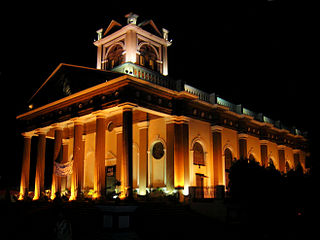
Kapurthala is a city in Punjab state of India. It is the administrative headquarters of Kapurthala District. It was the capital of the Kapurthala State, a princely state in British India. The aesthetic mix of the city with its prominent buildings based on French and Indo-Saracenic architecture self-narrate its princely past. It is also known as city of Palaces & Gardens. According to the 2011 census, Kapurthala is the least populated city in India.

Gurdaspur district is a district in the Majha region of the state of Punjab, India. Gurdaspur is the district headquarters. It internationally borders Narowal District of Pakistani Punjab, and the districts of Amritsar, Pathankot, Kapurthala and Hoshiarpur. Two main rivers Beas and Ravi passes through the district. The Mughal emperor Akbar is said to have been enthroned in a garden near Kalanaur, a historically important town in the district. The district is at the foothills of the Himalayas.

The Punjab Province was a province of British India. Most of the Punjab region was annexed by the British East India Company on 29 March 1849; it was one of the last areas of the Indian subcontinent to fall under British control. In 1858, the Punjab, along with the rest of British India, came under the rule of the British Crown. It had a land area of 358,355 square kilometers.

Kapurthala district is a district of Punjab state in northern India. The city of Kapurthala is the district headquarters.
Pratap Singh may refer to:

Majha is a region located in the central parts of the historical Punjab region split between India and Pakistan. It extends north from the right banks of the river Beas, and reaches as far north as the river Jhelum. People of the Majha region are given the demonym "Mājhī" or "Majhail". Most inhabitants of the region speak the Majhi dialect, which is the basis of the standard register of the Punjabi language. The most populous city in the area is Lahore on the Pakistani side, and Amritsar on the Indian side of the border.

Khalsa College is a historic educational institution in the northern Indian city of Amritsar in the state of Punjab, India. Founded in 1892, the sprawling 300-acre (1.2 km2) campus is located about eight kilometers from the city-center on the Amritsar-Lahore highway, adjoining Guru Nanak Dev University campus, to which Khalsa College is academically affiliated.
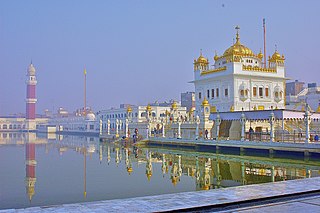
Tarn Taran district is one of the districts in the Majha region of Punjab, India. The main cities are Tarn Taran Sahib, Bhikhiwind, Khadur Sahib and Patti. The City of Tarn Taran Sahib is a holy place for Sikhs. Tarn Taran's Sikh population makes it the most heavily concentrated district of Sikhs in India and the world.
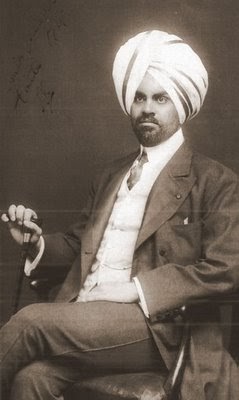
Colonel Maharajah Sir Jagatjit Singh Sahib Bahadur was the last ruling Maharaja of the princely state of Kapurthala during the British Raj in India, from 1877 until his death, in 1949. He ascended to the throne of Kapurthala state on 16 October 1877 and assumed full ruling powers on 24 November 1890 as well indulging in traveling the world and being a Francophile.

The Imperial Legislative Council (ILC) was the legislature of British India from 1861 to 1947. It was established under the Charter Act of 1853 by providing for the addition of 6 additional members to the Governor General Council for legislative purposes. Thus, the act separated the legislative and executive functions of the council and it was this body within the Governor General's Council which came to known as the Indian/Central Legislative Council. In 1861 it was renamed as Imperial Legislative Council and the strength was increased.

Kanwar Sri Bikrama Singh Bahadur was a 19th-century Sikh leader.

Harchand Singh Longowal was the President of the Akali Dal during the Punjab insurgency of the 1980. He had signed the Punjab accord, also known as the Rajiv-Longowal Accord along with Rajiv Gandhi on 24 July 1985. The government accepted most of the demands of Akali Dal who in turn agreed to withdraw their agitation. Less than a month after signing the Punjab accord, Sant Longowal was assassinated by Gyan Singh Leel and Jarnail Singh Halvara.
Raja Sir Harnam Singh Ahluwalia , KCIE was a member of the Kapurthala royal family in the direct line founded by Jassa Singh Ahluwalia.
Pratapsingh may refer to:
Governor Ujjal Singh was an Indian politician who was a participant in the First Round Table Conference, opened officially by King George V on 12 November 1930. Ujjal Singh served as the Finance Minister of Punjab, Governor of Punjab, followed by acting Governor of Tamil Nadu. Prior to this he was one of Pre-Partition Punjab's largest landowners, owning thousands of acres in Hadali, Jaranwala, Mian Channu, Lyallpur, Montgomery, Sargodha and other areas.
Bikrama Singh's Estates Act of 1883, was an unrepealed Act of the Government of India relating to the Awadh Estates of Kanwar Bikrama Singh of Kapurthala

Kapurthala State, was a kingdom and later Princely state of the Punjab Province of India. Ruled by Ahluwalia Sikh rulers, spread across 510 square miles (1,300 km2). According to the 1901 census the state had a population of 314,341 and contained two towns and 167 villages. In 1930, Kapurthala became part of the Punjab States Agency and acceded to the Union of India in 1947.
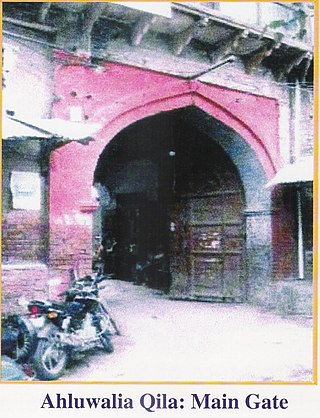
Ahluwalia was a misl, that is, a sovereign state in the Sikh Confederacy of Punjab region in present-day India and Pakistan. The misl's name is derived from Ahlu, the ancestral village of the misl leaders. The Ahluwalia misl was one of the 12 major Sikh misls, and held land to the north of Sutlej river.